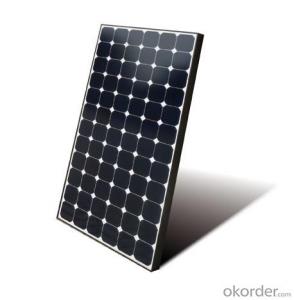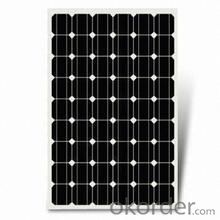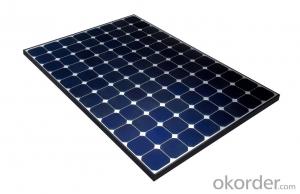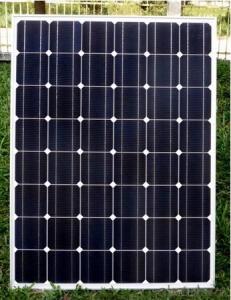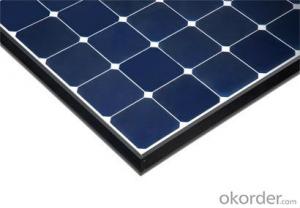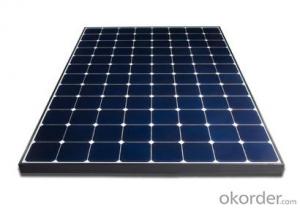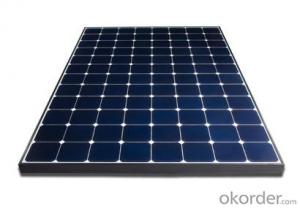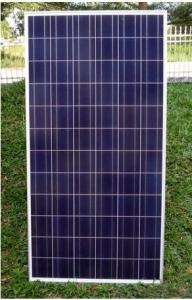Solar Energy Systems Canada - CNBM On Grid System 900W with Certificate UL TUV CE
- Loading Port:
- Shanghai
- Payment Terms:
- TT OR LC
- Min Order Qty:
- 100 watt
- Supply Capability:
- 1000 watt/month
OKorder Service Pledge
OKorder Financial Service
You Might Also Like
Specification
CNBM On Grid System 900W with Certificate UL TUV CE
Product description
A grid-connected photovoltaic power system, or grid-connected PV system is anelectricity generating solar PV system that is connected to the utility grid. A grid-connected PV system consists of solar panels, one or several inverters, a power conditioning unit and grid connection equipment. They range from small residential and commercial rooftop systems to large utility-scale solar power stations. Unlike stand-alone power systems, a grid-connected system rarely includes an integrated battery solution, as they are still very expensive. When conditions are right, the grid-connected PV system supplies the excess power, beyond consumption by the connected load, to the utility grid.
Connection of the photovoltaic power system can be done only through an interconnection agreement between the consumer and the utility company. The agreement details the various safety standards to be followed during the connection.[4]
Grid-connected PV can cause issues with voltage regulation. The traditional grid operates under the assumption of one-way, or radial, flow. But electricity injected into the grid increases voltage, and can drive levels outside the acceptable bandwidth of ±5%.[8]
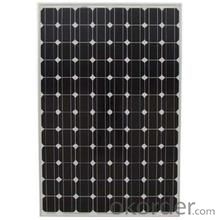
Application
Industrial
Commercial
Residential
Feature
Residential, grid-connected rooftop systems which have a capacity more than 10 kilowatts can meet the load of most consumers.[2] They can feed excess power to the grid where it is consumed by other users. The feedback is done through a meter to monitor power transferred. Photovoltaic wattage may be less than average consumption, in which case the consumer will continue to purchase grid energy, but a lesser amount than previously. If photovoltaic wattage substantially exceeds average consumption, the energy produced by the panels will be much in excess of the demand. In this case, the excess power can yield revenue by selling it to the grid. Depending on their agreement with their local grid energy company, the consumer only needs to pay the cost of electricity consumed less the value of electricity generated. This will be a negative number if more electricity is generated than consumed.[3] Additionally, in some cases, cash incentives are paid from the grid operator to the consumer.
Packaging
With carton and box
- Q: Can solar energy systems be used in areas with limited access to solar connectors and cables?
- Yes, solar energy systems can be used in areas with limited access to solar connectors and cables. Off-grid solar systems, such as standalone solar panels combined with battery storage, can be deployed in remote or inaccessible areas without the need for extensive infrastructure. These systems are self-sufficient and can generate and store electricity for use even without a direct connection to the grid. They are an excellent solution for providing renewable energy in areas where traditional electrical infrastructure is limited or non-existent.
- Q: Are there any noise or pollution concerns with solar energy systems?
- No, solar energy systems do not produce noise or pollution. They generate electricity by harnessing the power of sunlight, which is a clean and renewable source of energy.
- Q: How does the installation of solar panels affect the roof's warranty?
- The installation of solar panels typically does not void the roof's warranty. However, it is important to consult with the roofing manufacturer and installer to ensure that the installation process does not breach any warranty conditions.
- Q: What is the impact of temperature on the efficiency of a solar energy system?
- The efficiency of a solar energy system is significantly impacted by temperature. As the temperature increases, the efficiency of solar panels decreases. This is due to the behavior of the semiconductor materials used in solar cells. When solar panels are exposed to sunlight, they absorb photons and convert them into electricity. However, as the temperature rises, the resistance of the semiconductor material increases, leading to a decrease in the flow of current. This phenomenon is known as the temperature coefficient of power. The temperature coefficient of power is usually expressed as a percentage per degree Celsius and varies depending on the type of solar panel technology. Most solar panels have a negative temperature coefficient, meaning their efficiency decreases as the temperature rises. On average, the efficiency of solar panels can decrease by around 0.5% to 0.8% per degree Celsius increase in temperature. Additionally, increased temperatures can also cause thermal losses within the system. Heat can build up within the solar panels, reducing their efficiency further. This is especially true in hot climates or during periods of high solar irradiance. To mitigate the impact of temperature on solar energy system efficiency, various strategies can be employed. One common method is to incorporate cooling mechanisms, such as ventilation or water circulation, to dissipate the excess heat generated by the solar panels. This helps maintain lower operating temperatures and consequently improves the overall efficiency. Furthermore, proper system design and installation techniques can also help minimize temperature-related losses. For example, mounting solar panels with sufficient spacing to allow for air circulation can prevent overheating. Additionally, selecting solar panels with lower temperature coefficients can help mitigate efficiency losses in high-temperature environments. In conclusion, temperature has a significant impact on the efficiency of a solar energy system. Higher temperatures can cause a decrease in the efficiency of solar panels, primarily due to increased resistance in the semiconductor materials. To optimize the performance of solar energy systems, strategies such as cooling mechanisms and proper system design should be implemented.
- Q: What is solar battery storage?
- Solar battery storage technology refers to the efficient method of storing energy generated by solar panels in batteries for future consumption. This system captures surplus electricity produced by solar panels throughout the day and stores it in batteries, instead of feeding it back into the grid. Subsequently, this stored energy can be utilized during periods when solar panels are unable to generate sufficient electricity, such as at night or on cloudy days. The advantages of solar battery storage are manifold. Firstly, it empowers homeowners and businesses to become more self-reliant and decrease their dependence on the conventional electrical grid. By storing excess energy, they can tap into it during times of peak demand or power outages, ensuring a steady and uninterrupted power supply. Moreover, solar battery storage optimizes the utilization of solar energy. Typically, solar panels produce more electricity than is immediately required, resulting in wastage or transmission back to the grid. By utilizing battery storage, this surplus energy can be stored and utilized later, thereby maximizing the utilization of solar power and diminishing the need for fossil fuel-based electricity. Furthermore, solar battery storage can contribute to reducing electricity bills. By utilizing stored energy during periods of high demand, when electricity rates are elevated, users can avoid paying higher prices for grid electricity. Consequently, this can lead to substantial cost savings over time. In summary, solar battery storage is an innovative technology that enhances the efficiency and dependability of solar energy systems. It enables users to store surplus energy for future use, reducing reliance on the grid, optimizing the utilization of solar power, and potentially reducing electricity expenses.
- Q: What are the different incentives available for installing solar energy systems?
- Installing solar energy systems can become financially feasible for homeowners and businesses due to the availability of several incentives. One popular incentive is the federal investment tax credit (ITC), which allows individuals or businesses to deduct a percentage of the installation cost from their federal taxes. Currently, the ITC offers a 26% tax credit for residential and commercial systems installed before the end of 2022. Another incentive, known as net metering, enables solar system owners to receive credit for any excess electricity their system generates and feeds back into the grid. This credit can be used to offset electricity bills during periods when solar panels do not produce enough energy, such as at night or on cloudy days. Additionally, many states offer further incentives, including grants, rebates, or performance-based rewards, to encourage the adoption of solar energy systems. These incentives may vary by state but can significantly reduce the upfront costs of solar panel installations. Certain utility companies also provide incentives through solar renewable energy certificates (SRECs). These tradable credits represent the environmental attributes of a specific amount of electricity generated from solar energy. Homeowners or businesses can earn SRECs by generating solar electricity and sell them to utilities, providing an additional source of income. Lastly, some local governments offer property tax exemptions or deductions for solar energy system installations. This means that the added value of a solar system to a property does not result in increased property taxes, making solar installations financially more appealing. All of these incentives work together to offset the initial investment and ongoing costs of solar energy systems, making them a viable and affordable option for those interested in adopting renewable energy and reducing their carbon footprint.
- Q: Are there any risks of electrical fires with solar energy systems?
- Yes, there are potential risks of electrical fires with solar energy systems. While solar panels themselves do not generate heat or pose a direct fire hazard, the electrical components and wiring involved in the system can be a source of concern. Poor installation, faulty wiring, or system malfunctions can lead to electrical fires. Therefore, it is important to ensure proper installation, regular maintenance, and adherence to safety guidelines to mitigate these risks.
- Q: How much space do I need for a solar energy system?
- The space required for a solar energy system depends on various factors such as the size of the system, the amount of energy needed, and the efficiency of the solar panels. In general, for a residential solar energy system, you would need a roof space of about 100-400 square feet per kilowatt (kW) of solar panels. However, there are alternative options like ground-mounted systems or solar canopies that can be used if roof space is limited. It is recommended to consult with a solar energy professional who can assess your specific energy needs and available space to determine the appropriate size and configuration of the system.
- Q: What is the impact of solar energy systems on air quality?
- Solar energy systems have a positive impact on air quality as they produce electricity without emitting harmful pollutants or greenhouse gases. By reducing the reliance on fossil fuels, solar energy helps to mitigate air pollution, improve public health, and combat climate change.
- Q: Can solar energy systems be used for powering research laboratories?
- Certainly, research laboratories can be powered by solar energy systems. Solar energy offers a clean and renewable power source that can be harnessed using photovoltaic (PV) panels or solar thermal systems. To meet the electricity demands of research laboratories, which often require significant power for equipment, lighting, and ventilation, solar energy is an effective solution. One option is to install solar PV panels on the laboratory's rooftop or surrounding open areas. These panels capture sunlight and convert it into electricity, which can then be used to power the laboratory's infrastructure, including computers, microscopes, refrigeration units, and specialized equipment. Any excess electricity can be stored in batteries or fed back into the grid, providing energy for later use or offsetting costs. Alternatively, solar thermal systems can generate heat for laboratory processes that require heating, such as sterilization or chemical reactions. These systems use sunlight to heat a fluid, which can be utilized directly or indirectly to provide heat to the laboratory. By implementing solar energy systems, research laboratories not only reduce reliance on fossil fuels but also decrease greenhouse gas emissions, contributing to environmental sustainability. In the long run, it can lead to cost savings as solar energy is essentially free once the initial installation costs are recovered. It is important, however, to consider the specific energy requirements of the laboratory and conduct a comprehensive feasibility study before installing solar energy systems. Factors such as location, available sunlight, roof orientation, and space availability should be taken into account to ensure optimal system performance. Additionally, a backup power source or grid connection may be necessary to ensure uninterrupted power supply during periods of low sunlight or high energy demand. In conclusion, solar energy systems offer a sustainable and viable solution for powering research laboratories, providing clean and reliable energy to support scientific advancements.
Send your message to us
Solar Energy Systems Canada - CNBM On Grid System 900W with Certificate UL TUV CE
- Loading Port:
- Shanghai
- Payment Terms:
- TT OR LC
- Min Order Qty:
- 100 watt
- Supply Capability:
- 1000 watt/month
OKorder Service Pledge
OKorder Financial Service
Similar products
Hot products
Hot Searches
Related keywords
